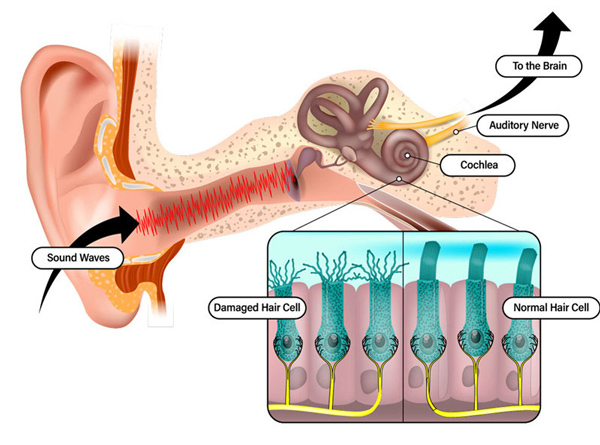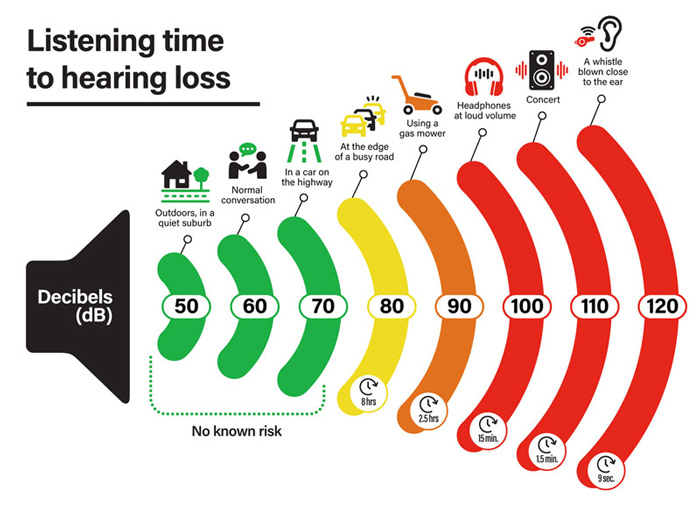Noise and sound: Hearing loss and tinnitus
On this page
- Hearing loss
- Tinnitus
- How loud sound affects your ears over time
- How to tell if a sound is too loud
- Warning signs of hearing loss
Hearing loss
The primary causes of permanent hearing loss are age and exposure to loud sounds.
Age-related hearing loss:
- is permanent
- happens slowly
- affects both ears
- can't be avoided
- can't be cured, only managed
- can range from mild to severe
- is a common problem linked to aging
- typically begins later in life and isn't usually detected until after the age of 50
Anyone can experience age-related hearing loss as they get older. However, it can happen much earlier for people who don't take proper care of their hearing while:
- working in noisy places
- participating in noisy activities
When hearing loss is caused by exposure to loud sounds, it is called noise-induced or sound-induced hearing loss.
Sound-induced hearing loss:
- can be avoided
- can start at any age
- affects 1 or both ears
- can range from mild to severe
- can't be cured, only managed
- usually happens slowly, but it can be sudden if the sound is loud enough
- can be temporary at first, but become permanent with repeated loud sound exposure
- is a common problem for people who are frequently exposed to loud sounds and who don't take steps to protect their hearing
Both age-related and sound-induced hearing loss are types of sensorineural hearing loss. People with these types of sensorineural hearing loss will have similar difficulties in their daily lives depending on the severity of the hearing loss.
Mild hearing loss can make communication difficult. People with mild hearing loss may miss certain parts of conversations, especially over the phone. Mild hearing loss can make it difficult to:
- understand higher pitched voices
- properly hear consonants like "f," "t" and "s"
- tell the difference between the "sh" and "th" sound in speech
These difficulties can:
- have a negative impact on relationships
- lead to miscommunication and frustration
Most people who have mild hearing loss aren't even aware they have it. In a study that looked at hearing loss among people in Canada between the ages of 40 and 79, 8% of men and 5% of women self-reported hearing impairment. But when researchers measured the hearing of participants in the study, they found that 63% of men and 46% of women had measurable hearing loss.
Mild hearing loss can get worse over time and become moderate, especially with repeated exposure to loud sounds. Someone with moderate hearing loss will often need to ask people to repeat themselves or to speak louder when communicating in person and on the phone. If someone's hearing loss becomes severe enough, they won't be able to follow conversations unless they have hearing aids.
Difficulty communicating can impact relationships leading to smaller social networks and feelings of loneliness. In children and adolescents, even minimal hearing loss can have effects on:
- academic performance
- language development
- social and emotional development
In adults, hearing loss and impairment is associated with:
- anxiety
- depression
- low income
- decreased employment opportunities
Tinnitus
Exposure to loud sounds can cause tinnitus, a symptom of damage to the hair cells in the inner ear. Tinnitus is often referred to as a phantom ringing in 1 or both ears, however some people experience it as hissing, ringing, roaring, clicking, buzzing or other sounds.
Tinnitus can be temporary or permanent. For some people, experiencing temporary tinnitus doesn't bother or annoy them. For others, it's been associated with:
- stress
- anxiety
- irritation
- insomnia
- depression
- social isolation
- sleep problems
- feelings of loneliness
- difficulty concentrating
Tinnitus can occur because of exposure to loud sounds, such as attending a concert without hearing protection. Tinnitus can happen without hearing loss but it might also be a sign of hearing loss that's imminent or already present. Like hearing loss, there's no known cure, only treatments to help manage the symptoms.
Health reports: Tinnitus in Canada
How loud sound affects your ears over time

When sound reaches your ears, it travels along your ear canal to your eardrum causing it to vibrate. The vibrations are transmitted by 3 small inner ear bones into your inner ear (cochlea). In the cochlea, there is fluid and hair cells, also known as sensory cells. These hair cells convert sound into electrical signals that travel along the auditory nerve to the brain. Your brain interprets the signals as things like speech, music or noise. You're born with a set number of hair cells. Once they die, your body doesn't replace them.
Loud sounds damage the hair cells in your cochlea. Hair cells are rigid structures and regular exposure to loud sound causes them to lose their rigidity over time. Like grass that's stepped on, hair cells get bent by sounds. This is especially true for loud sounds.
Grass eventually dies when it's repeatedly walked over or trampled. Similarly, hair cells can be 'trampled' by loud sounds until they die and can no longer convert sound into electrical signals for the brain. This happens faster:
- the longer your ears are exposed to loud sounds
- the louder the sound with fewer breaks in between the exposure
These physical changes to the ear present as tinnitus, hearing loss or both. Sometimes, this can also present as hyperacusis, a disorder where a person becomes even more sensitive to sound because of damage to the hair cells.
Have you ever experienced temporary hearing loss or tinnitus after a loud sound exposure, like being at a concert or sporting event? If so, it means there was permanent damage done to some of your thousands of hair cells. They may have died off or become very broken. That damage will add up to permanent problems over time.
The likelihood that you'll develop hearing loss, tinnitus or both depends on:
- how loud the sound is
- how long you're exposed to it
- how often you repeat that pattern
For example, you are more likely to develop hearing loss, tinnitus or both if you:
- attend loud parties, dance clubs or other live music or sporting events without hearing protection weekly and
- listen to loud music or other audio using headphones daily and
- work in a noisy environment without hearing protection and
- do this over several years
The effect that loud sounds have on your hearing is cumulative. Repeated exposure to loud sounds and noise in earlier years could speed up age-related hearing loss in later life, more than what would be expected due to the natural process of aging.
How to tell if a sound is too loud
Sounds with levels below 70 dBA pose no known risk of hearing loss, no matter how long the exposure lasts. A sound level of 70 dBA is about what you would experience while driving alone in a car at highway speeds with the windows closed and the radio off.
For sounds at levels higher than 70 dBA, the amount of time you're exposed becomes an important factor. For example, listening to music:
- at 85 dBA for 45 minutes a day poses no known risk of hearing loss
- at 85 dBA or higher for 8 hours a day can pose a significant risk of hearing loss
85 dBA is about what you would experience standing on the corner of a busy city street with lots of traffic going by.

Listening time to hearing loss - Text description
| Situation example | Decibel level | How long until you risk hearing loss |
|---|---|---|
| Outdoors in a quiet suburb | 50 dB | No known risk |
| Having a normal conversation with someone in a quiet room | 60 dB | No known risk |
| In a car on the highway with the windows closed | 70 dB | No known risk |
| Standing at the edge of a busy road | 80 dB | 8 hours |
| Using a gas lawn mower | 90 dB | 2.5 hours |
| Using headphones or ear buds at a loud volume | 100 dB | 15 minutes |
| Attending a concert | 110 dB | 1.5 minutes |
| Having a whistle blown close to your ear | 120 dB | 9 seconds |
Warning signs of hearing loss
Know the warning signs of early hearing loss and talk to a healthcare professional if:
- you think that people are mumbling
- you have a feeling of fullness in your ear
- you need to turn the volume on the tv or radio up more than you did in the past
- someone in your household consistently complains you have the volume turned up too loud
- someone you know well and see often tells you they think you need to have your hearing checked
- you hear a hissing, ringing, roaring, clicking or buzzing sound in your ear when there's nothing making these sounds
- you have difficulty trying to follow a face-to-face conversation with someone in a location where there's a lot of background noise, like at a restaurant
- you have difficulty trying to follow a conversation while talking on the phone while there are background sounds, for example, the TV is on or you're in a busy cafeteria
Check your hearing: Download the HearWHO App